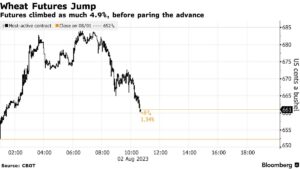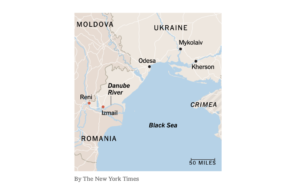A prolonged military conflict in the Middle East could potentially upend key commodity markets due to Iran’s control of the Strait of Hormuz, one of the world’s most important trade…
Danube River Port of Izmail Attacked, “Raising Further Concerns over Global Food Supplies”
Financial Times writers Christopher Miller and William Langley reported today that, “Russia attacked targets across Ukraine with drones before sunrise on Wednesday, hitting a critical river port facility and a grain silo in the southern Odesa region and raising further concerns over global food supplies.
“Ukraine’s air defence forces ‘worked nonstop for almost three hours’ to protect the Odesa region, the country’s Operational Command South wrote on Telegram. The region’s governor Oleh Kiper said fires had broken out at the port and emergency workers were rushing to put them out.
Videos and photos posted by Odesa authorities and local media showed flames and massive damage to the port of Izmail, which lies on the Danube river across from Romania, a Nato member and EU country.
“‘Russian terrorists again attacked ports, grain and global food security. The world must respond,’ Ukraine’s president Volodymyr Zelenskyy said. There were no casualties, he said, but the drones caused ‘significant damage.'”
Also today, Bloomberg writers Megan Durisin, James Poole, and Andra Timu reported that, “Wheat futures rose, while paring their earlier surge, as traders weigh new attacks at Ukraine’s ports and stiff global export competition.

“Russian drones struck a Ukrainian port on the Danube River, damaging grain-storage facilities. Government and industry officials with knowledge of the situation said the attacks hit Izmail, one of Ukraine’s biggest river terminals near the border with Romania.”
Durisin, Poole, and Timu added that, “Russia has previously attacked ports in the Odesa region and on the Danube river in a bid to disrupt Ukraine’s exports. Last week it attacked the Danube port of Reni, sending wheat up by the exchange limit that day.”
Reuters writers Gus Trompiz and Naveen Thukral reported today that, “Chicago wheat rose sharply on Wednesday to recover from a two-week low as Russian strikes damaged a Ukrainian port on the Danube river, reviving fears of disruption to Black Sea trade.
“The Russian attack on southern Ukraine in the early hours of Wednesday, which struck grain facilities at Izmail on the Danube, underscored the risk of a further squeeze on Ukrainian exports after Moscow last month pulled out of an agreement allowing grain shipments from Ukrainian Black Sea ports.”
And Reuters writer Pavel Polityuk reported today that, “The [Danube port of Izmail in the Odesa region], across the river from NATO-member Romania, has served as the main alternative route out of Ukraine for grain exports since Russia reintroduced its de facto blockade of Ukraine’s Black Sea ports in mid-July.”
Homes. Ports. Grain silos. Historic buildings. Men. Women. Children. Round-the-clock and intensifying Russian strikes on Kryvyi Rih, Kharkiv, Kyiv, Kherson make it clear once again Russia has no desire for peace, no thought for civilian safety, and no regard for people around the…
— Ambassador Bridget A. Brink (@USAmbKyiv) August 2, 2023
“An industry source also confirmed Izmail was the main target of the attack, describing the level of damage there as ‘serious,'” the article said.
Polityuk added that, “Russia has relentlessly attacked Ukrainian agricultural and port infrastructure for more than two weeks, since refusing to extend an agreement that had lifted its war-time blockade of Ukrainian ports last year.”
And Marc Santora reported in today’s New York Times that, “But while Russian ships menaced off the Ukrainian coast, the small ports in the Danube river on the Romanian border kept working, offering a small but vital lifeline. Their importance continued to grow even after an internationally brokered deal with Russia stabilized the shipping routes on the Black Sea for the limited movement of foodstuffs.
Now, two weeks after the collapse of that deal, the small Danube ports are the only shipping outlet for millions of tons of grain once again trapped in Ukraine — and Russia has made clear they, too, are under threat.
“‘The Danube is our gateway at sea to Europe and the world,’ Stanislav Zinchenko, chief executive of GMK, a Kyiv-based economic think tank, said in an interview.”

Today’s article explained that, “Andriy Klymenko, the head of the Institute for Strategic Black Sea Studies, said the term ‘blockade’ did not exactly apply to the Danube ports, which were never covered in the grain deal and have been working almost nonstop through the war.
“The Russian threats presented more of a ‘dare,’ he said, with Moscow clearly hoping that the implicit threat of harassment and violence would intimidate international shipping companies and sailors.
“At least 16 ships are still anchored south-southwest of Snake Island, just off the Ukrainian coast, waiting to go to the ports, Mr. Klymenko said.
“The ships have navigated their way to Ukraine by largely staying within 12 miles of the coasts of Bulgaria and Romania, within the territorial waters of those countries, both part of NATO, in hopes of avoiding Russian warships and Russian naval mines, shipping experts said.”





